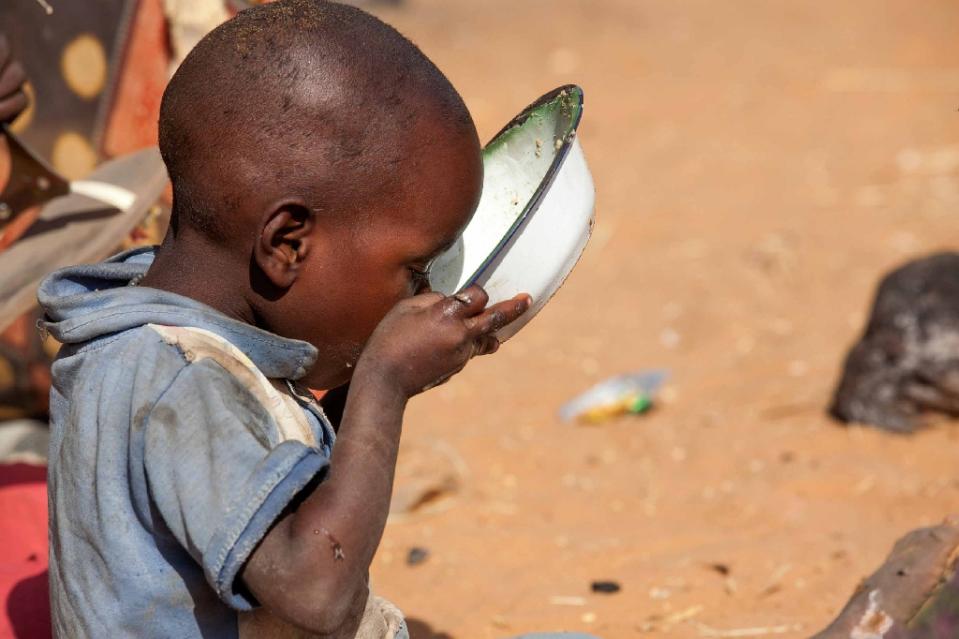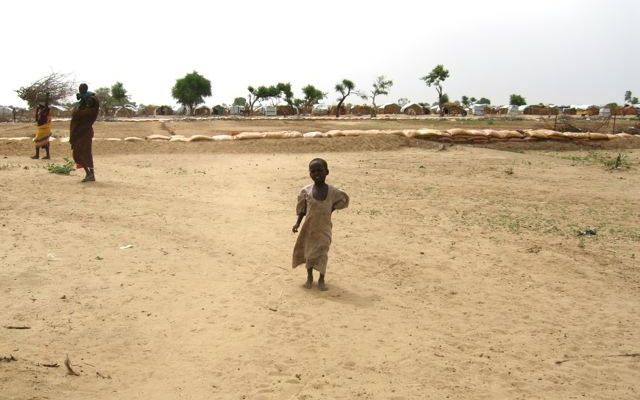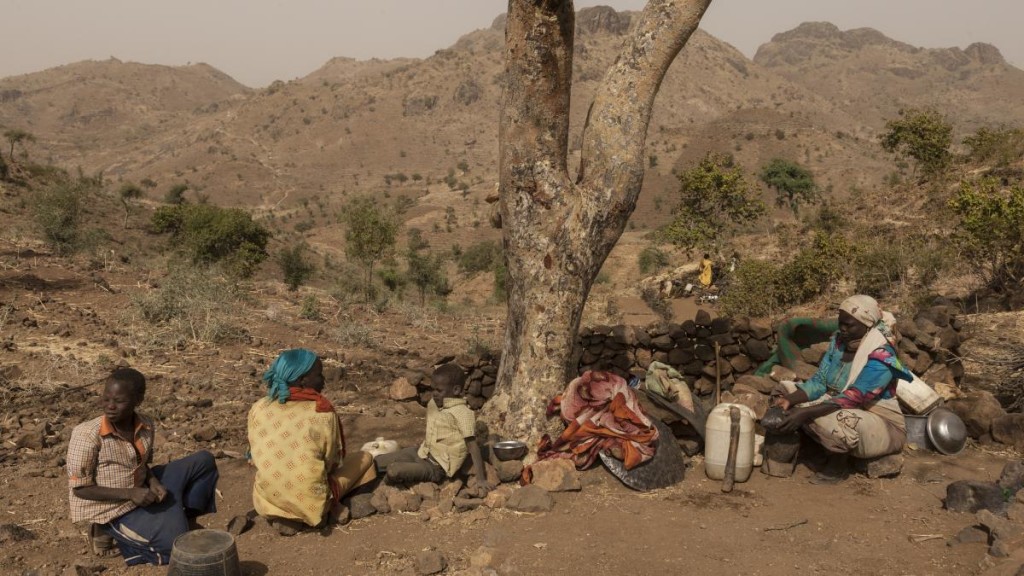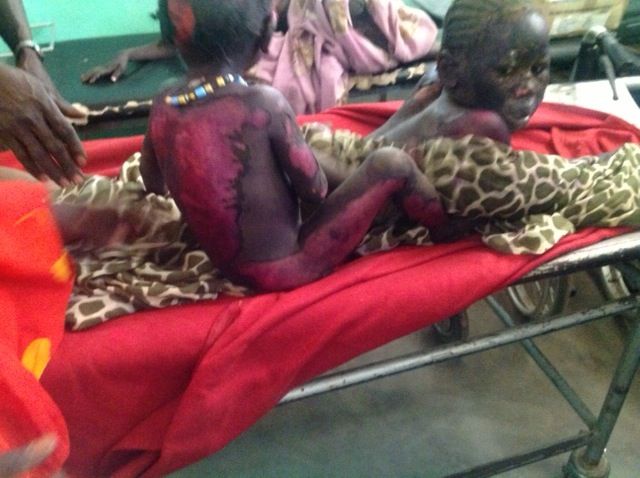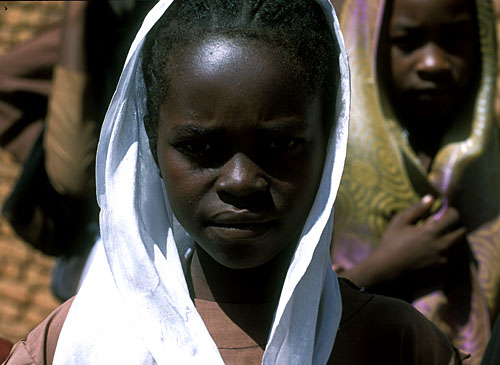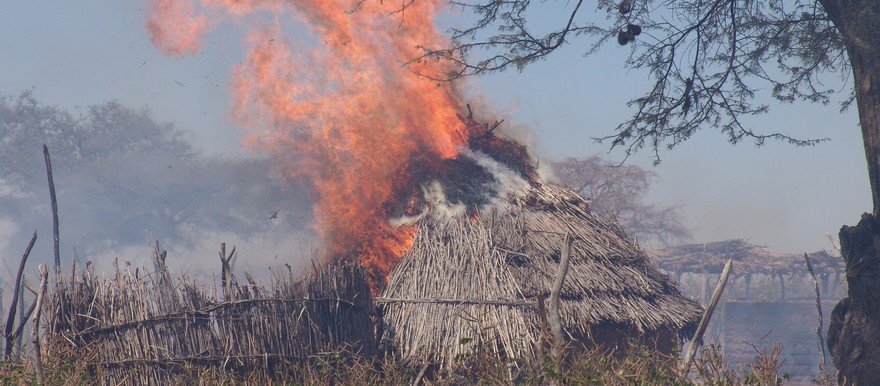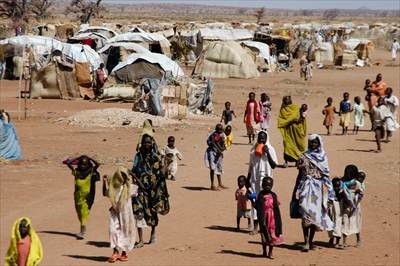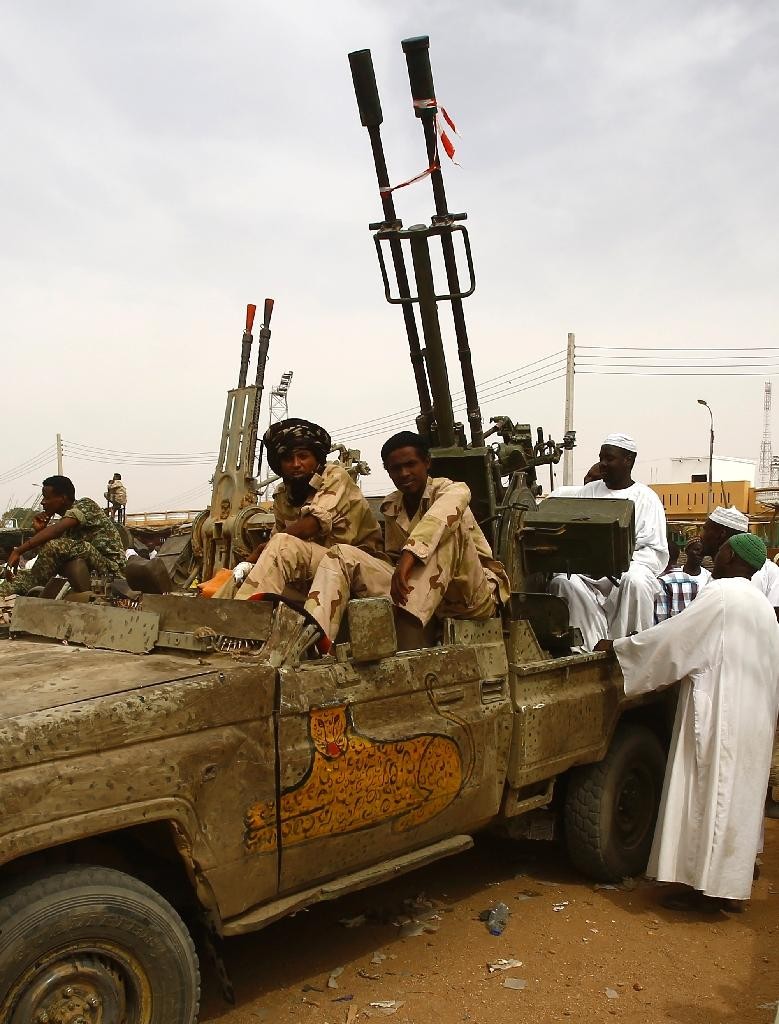This is the twenty-fifth installment of Darfur: Radio Dabanga News Digest; it focuses on events of the past two weeks, including violence and insecurity in North Darfur and the continuing deterioration in humanitarian conditions throughout Darfur and much of Sudan. This digest focuses on those stories most illustrative of the grim relief needs affecting millions of Sudanese; these are communities that have suffered most and experienced the greatest harm from the actions of various European and other financial institutions.
Of particular note is the continuing violent seizure of lands and livelihoods in Darfur, coupled with the relentless aerial assault on agricultural production in Darfur, South Kordofan, and Blue Nile. Together these assaults have created an extremely food insecure environment, reflected in figures from the UN’s World Food Program, UNICEF, and the Office for the Coordination of Humanitarian Affairs.
At the same time, ground violence continues to exact a terrible toll on civilian life and well-being. Rape continues to be weapon of war used on a vast scale, particularly in Darfur but in South Kordofan and Blue Nile as well. Village destruction continues at a terrifying pace in North Darfur, creating more and more displaced persons—many of whom cannot reach IDP camps. And those camps are themselves increasingly subject to assault, denial of humanitarian access, and general insecurity.
Broadest context:
Throughout Darfur and indeed much of Sudan, various humanitarian indicators continue a relentless deterioration. Additionally, the most recent reports from the UN’s Office for the Coordination of Humanitarian Affairs (OCHA) presents a truly terrifying portrait of malnutrition throughout Sudan, but especially in Darfur, where most of the region is indicated as suffering from Global Acute Malnutrition (GAM) rates that are above the emergency humanitarian threshold; large excerpts from the report and commentary may be found here. Huge swathes of eastern Sudan, Blue Nile, and other areas also have GAM rates above the emergency threshold.
Khartoum’s unrelenting campaign of international intimidation and deception:
International failure to come to terms with the real nature of the Khartoum regime continues to be on painful display. The U.S. and Europe have never seemed more powerless in bringing about the changes necessary if Sudan is to escape the 26 years of brutal tyranny by the National Islamic Front/National Congress Party, and its endless wars on its own people. Khartoum’s imposition of a humanitarian embargo on large parts of South Kordofan and Blue Nile—dating to June 2011—continues without meaningful international objection or pressure on Khartoum to relent this brutal war strategy of killing civilians to weaken rebel forces. The African Union has proved both feckless and corrupt in its dealings with Khartoum.
Hollow at the core: the Sudanese economy:
Sudan itself continues to give all the evidence one would expect of an imploding economy: high inflation, a further decline in the value of the Sudanese Pound, an almost total lack of foreign exchange currency, a decline in remittances from abroad, and water shortages that are a function of the regime’s refusal to invest in a national infrastructure for key resources and commodities. The agricultural sector also continues in steep decline, even as external debt continues to rise: it now stands at over $47 billion.
BNP Paribas restitution funds for greater Sudan:
These funds (see http://sudancommunitycompensation.org/) will be effective in providing emergency relief aid only if there is greater pressure on Khartoum to grant humanitarian access. Much of the money is desperately need for current programs that are grossly underfunded; but much of what is needed most urgently requires greater access than Khartoum presently provides.
[Because the News Digest now appears on a biweekly basis, dispatches will typically be reduced to the title, the URL (always embedded in the title), and perhaps a key sentence—and much diminished commentary will be even briefer.]
[For previous Radio Dabanga Digests, see:
Darfur: Radio Dabanga Digest, Number 1 | http://wp.me/p45rOG-1CD
Darfur: Radio Dabanga Digest, Number 2 | http://wp.me/p45rOG-1De
Darfur: Radio Dabanga Digest, Number 3 | http://wp.me/p45rOG-1Dt
Darfur: Radio Dabanga Digest, Number 4 | http://wp.me/p45rOG-1Ei
Darfur: Radio Dabanga Digest, Number 5 | http://wp.me/p45rOG-1EL
Darfur: Radio Dabanga Digest, Number 6 | http://wp.me/p45rOG-1Fp
Darfur: Radio Dabanga Digest, Number 7 | http://wp.me/p45rOG-1FL
Darfur: Radio Dabanga Digest, Number 8 | http://wp.me/s45rOG-6452
Darfur: Radio Dabanga Digest, Number 9 | http://wp.me/p45rOG-1Gi
Darfur: Radio Dabanga Digest, Number 10 | http://wp.me/p45rOG-1Gt
Darfur: Radio Dabanga Digest, Number 11 | http://wp.me/p45rOG-1Hq
Darfur: Radio Dabanga Digest, Number 12 | http://wp.me/p45rOG-1HY
Darfur: Radio Dabanga Digest, Number 13 | http://wp.me/p45rOG-1Ia
Darfur: Radio Dabanga Digest, Number 14 | http://wp.me/p45rOG-1II
Darfur: Radio Dabanga Digest, Number 15 | http://wp.me/p45rOG-1Ji
Darfur: Radio Dabanga Digest, Number 16 | http://wp.me/p45rOG-1JU
Darfur: Radio Dabanga Digest, Number 17 | http://wp.me/p45rOG-1Kp
Darfur: Radio Dabanga Digest, Number 18 | http://wp.me/p45rOG-1L7
Darfur: Radio Dabanga Digest, Number 19 | http://wp.me/p45rOG-1Lm
Darfur: Radio Dabanga Digest, Number 20 | http://wp.me/p45rOG-1LM
Darfur: Radio Dabanga Digest, Number 21 | http://wp.me/p45rOG-1Mv
Darfur: Radio Dabanga Digest, Number 22 | http://wp.me/p45rOG-1MX
Darfur: Radio Dabanga Digest, Number 23 | http://wp.me/p45rOG-1Nr
Darfur: Radio Dabanga Digest, Number 24 | http://wp.me/p45rOG-1NH
Darfur: Radio Dabanga Digest, Number 25 | http://wp.me/p45rOG-1NT
Per usual, Sudan Tribune has again been the source of several key reports on Darfur and the growing political crisis in Sudan. All emphases in all quoted material (in bold) have been added; all editorial comments are in italics, in blue, with my initials following. A useful and quite recent administrative map of Darfur appears here.
[1] Humanitarian Indicators
This section of dispatches focuses on particular stories indicative of the larger humanitarian crisis throughout Sudan, Darfur in particular.
More than 20 die from disease in Central Darfur camps | September 21, 2015 | Zalingei, [formerly West] Darfur
Central Darfur camps: 21 malaria dead in a week | September 27, 2015 | Garsila, formerly West Darfur
The displaced living in the camps near Garsila, capital of Central Darfur’s Wadi Salih locality, complain of a rapid spread of malaria and soaring medicine prices. “This week 21 people died in Jedda and El Jebel camps,” a sheikh told Radio Dabanga on Friday. Most of them were children and the elderly, whose relatives are not able to pay for the high examination costs and medicines.” He explained that the costs of a medical examination have risen to SDG30 ($5), and the price of anti-malaria medicine SDG120 ($20).
“There are dozens of patients lying bedridden in their homes in the camps of Jedda, El Jebel, Ardeba and Dubba El Gadeema camps, who do not have proper medicines because of their financial circumstances. This leads to a high mortality,” he explained.
The sheikh said that malaria started to spread in the camps about two months ago after the first rains fell. “The hospitals in the area now receive between 50 and 70 patients a day.”
South Darfur water unsafe | September 17, 2015 | Nyala, South Darfur
[An ongoing crisis throughout Darfur, and indeed Sudan as a whole—ER]
Water shortages, and shortages of clean water, are now endemic in Sudan
Children, elderly die of disease in North Darfur | September 16, 2015 | Saraf Umra
Newly displaced in South Darfur’s El Salam camp still live rough | September 23, 2015 | El Salam Camp
North Darfur displaced disappointed in WFP assessment | September 13, 2015 | Kutum, North Darfur
The displaced residents of the camps in Kutum locality in North Darfur have described the results of the needs inventory conducted by the World Food Programme (WFP) in late 2014 and early 2015 as “disappointing.” They describe it as “an early withdrawal of the WFP rather than an early recovery,” as it has excluded and deprived large numbers of displaced people of food rations.
[The simple truth is that WFP does not have enough food or implementing partners on the ground in Darfur to provide for all in need; some of the means by which this basic fact are obscured are deeply disingenuous—ER]
Darfuri refugees in Chad reject repatriation “now“ | September 23, 2015 | Touloum Refugee Camp
The head of the Touloum refugee camp told Radio Dabanga that the Darfuri refugees would love to return to their places of origin, but that the timing is not appropriate. “The implementation of a repatriation programme requires a secure situation, based on a comprehensive peace agreement for the entire Sudan, as well as the provision of adequate services and infrastructure,” he said. “Further, the new settlers who have taken over our lands are to be evacuated and the refugees have to be compensated, individually and collectively.”
“New return committee to move South Darfur displaced” | September 22, 2015 | Kass, South Darfur
Displaced people living in camps in Kass locality, South Darfur, have described the new voluntary return projects by the government and Darfur Regional Authority as a “conspiracy aimed at implementing the government’s plan to dismantle the camps.” Speaking to Radio Dabanga, displaced people warned the voluntary return committee of the consequences if the programme is implemented, by replacing the high committee for the displaced. They revealed that the Regional Authority has formed a committee of seven people to move the displaced in Kass camps, totalling about 235,000.
There are plans to move the populations from eight areas including Kerling Bang, northeast of Kass, Rotkoki, southeast of Kass, and Karki which is east of Zalingei. The displaced people claimed that the government and the Regional Authority have managed to tempt 16 members of their high committee to join their committee. Some leaders of the displaced people have reportedly joined the seven-member committee. They also renewed their rejection of any programme that is related to the voluntary return of displaced people, unless the Janjaweed in Darfur are disarmed, (militant) new settlers in their home areas are expelled, security services are provided there, and a just and comprehensive peace is achieved in Sudan.
[This dispatch, as well as the preceding, highlights the acute threat to any meaningful peace that does not take into account restoring land ownership to those who have been displaced. Of more pressing concern, any “returns” amidst prevailing insecurity is certain to result in an upsurge in violence and human destruction —ER]
More than 50,000 Sudanese left the country last year | September 20, 2015 | Khartoum
This continues a long time trend and should be seen in the context of an earlier Radio Dabanga dispatch (August 9, 2015):
Last week, more than 12,000 Sudanese applied for an exit visa, according to the secretary-general of the Expatriates’ Affairs Secretariat in Khartoum. Suwar Majed Haj told the press on Thursday that the number of Sudanese who want to leave the country is showing a significant increase. He said that some 4,500 electronic passports were issued “during the past three days.” Statistics show that between 1975 and 2009 about 11 million Sudanese left the country. 85 percent of them emigrated after President Omar Al Bashir took power in a military coup in 1989. Sudan ranks first among Arab countries whose citizens emigrate, according to a survey conducted by the Arab Centre for Research and Policy Studies in Doha in 2013.
[Some surveys suggests that well over half the Sudanese population wishes to emigrate—ER]
18 girls injured in school collapse in North Darfur camp | September 18, 2015 | El Fasher / Bindisi
[Many camp structures are very flimsy and hastily constructed; accidents such as this are regularly reported by Radio Dabanga—ER]
Contradicting reports about return of North Darfuri refugees | September 20, 2015 | El Fasher / Khartoum
Media report: military residues contaminate Sudan’s White Nile | September 18, 2015 | Khartoum
“Most West Darfur displaced children homeless”: Education Minister | September 15, 2015 | El Geneina
[There could hardly be a grimmer statistic—ER]
Genocidal counterinsurgency warfare in Darfur has created hundreds of thousands of orphans
Shoddy medicines, hospital clean-up in North Darfur | September 14, 2015 | El Fasher
from Sudan Humanitarian Bulletin (OCHA), Issue 28, September 14 – 20, 2015
“IDPs in Nierteti have not received Emergency Food Rations since being displaced in March and June”
Some 1,700 IDPs have reportedly not received emergency food rations since being displaced to Nierteti town in Central Darfur’s West Jebel Marra between March and June 2015. The IDPs fled from areas in North and Central Jebel Marra (formerly Rokoro locality), including Golo town, as a result of fighting between government forces and armed groups earlier in the year.
Life as a displaced person with nowhere to go (photograph by Human Rights Watch)
from Sudan Humanitarian Bulletin (OCHA), Issue 37, September 7 – 13, 2015
“West Darfur: two killed in ambush on aid workers”
On 8 September, unidentified gunmen ambushed a vehicle carrying State Ministry of Health and World Health Organization (WHO) representatives in West Darfur, killing a security official and the health ministry driver. The attack took place about 40kms from El Geneina in Kereinik locality as the aid workers were returning from a routine mission… Kereinik locality hosts about 80,000 displaced people, in three main camps. It is one of the localities in West Darfur with the greatest humanitarian needs and many humanitarian organizations frequently travel to the area. Since January 2015, there have been 131 security incidents in Darfur that have affected humanitarian workers and peacekeepers, including abductions, armed attacks, carjackings and crime.
“Sudan: 3.1 million children are out of school”
Over 3.1 million of Sudan’s 7.9 million school-aged children (between 5 and 13 years) in Sudan are out of school, which is the highest rate in the Middle East and North Africa, according to a report. Sudan’s first Out-of-School Children Report [was] released 10 September by the Ministry of Education, with the support of the UN Children’s Agency (UNICEF) and the UN Educational Scientific and Cultural Organization (UNESCO)…
[2] Consequences of Violence and Insecurity:
This section of dispatches focuses on recent examples of rape, robbery, pillaging, land seizures, and aerial assaults. While the consequences of such violence are highly various, all have created and continue to create intense humanitarian need, whether it be psychosocial counseling, schooling, or emergency food and shelter.
Unknown gunmen kill two humanitarian workers in West Darfur | Sudan Tribune | September 10, 2015 | Khartoum
Unidentified gunmen killed two people in ambush on a humanitarian team in West Darfur state, the UN Office for the Coordination of Humanitarian affairs (OCHA) said …
[Such attacks could trigger an exodus by international humanitarian organizations already working in conditions that are intolerably insecure—ER]
Sudanese army carries out air attacks in Blue Nile despite ceasefire | Sudan Tribune | September 25, 2015 | Khartoum
The Sudanese army carried out fresh bombardments on a number of villages in the Blue Nile state despite a presidential decree, announced the Sudan People’s Liberation Army-North…
[There is simply no historical evidence—none—that Khartoum intends to abide by any ceasefire unless it is expedient to do so; in the present case, the campaign of extermination in Blue Nile is far from complete, and no regime-announced ceasefire will hold—ER]
Farms destroyed in South Kordofan bombing | September 13, 2015 | Kadugli
Bombing attacks destroy not only crops and the security necessary to grow them; they destroy human beings as well
Grandmother dies from shock as girl abused in North Darfur | September 12, 2015 | Kabkabiya
Girl raped near Tabit, North Darfur | September 25, 2015 | Tabit, North Darfur
Another target of rape in Darfur
South Darfur returnee killed at farm | September 22, 2015 | Bielel, South Darfur
A displaced woman was shot dead on her farm in Bielel locality, South Darfur, on Monday. A nephew of 54-year-old Hawa Khalil Adam told Radio Dabanga that she lived in Otash camp in Nyala, but had returned to Tortaan area. She went there with her daughter and husband to attend the farms. Two gunmen opened fire on them at the farm on Monday, seriously wounding her. She was transferred to a hospital where she died from her injuries.
[Such attacks make impossible any thought of return by the vast majority of displaced persons, including Chadian refugees—ER]
Darfur: Ten wounded, two raped in East Jebel Marra attack | September 21, 2015 | Tawila, North Darfur
[West] Darfur girl dies defending mother | September 24, 2015 | Mukjar
Gunmen attack farmers, shoot dead baby in Central Darfur | September 14, 2015 | Bindisi / El Sareif
Village destruction, particularly in North Darfur, continues to take a terrible toll on the people of Darfur and is the primary engine of human displacement
Central Darfur farmer murdered | September 24, 2015 | Zalingei, formerly West Darfur
North Darfur militia threatens new Tawila raid | September 24, 2015 | Tawila, North Darfur
The number of people killed and injured in Tuesday’s attack on Tawila, North Darfur, on Tuesday has risen to 28. Omda Mukhtar Bosh, coordinator of the Tawila camps for the displaced, informed Radio Dabanga that 28 people were killed or wounded, including 13 attackers, on Tuesday afternoon, when militiamen raided a reception in the town, held on the occasion of the arrival of the new Commissioner…
The camp coordinator added that traffic to and from the town “has come to complete standstill” since Tuesday “because the government-backed militiamen made camp some five kilometres south of Tawila, where they are driving their vehicles, horses, and camels, threatening to storm the town and plunder the market.”
Three raped in Darfur’s Jebel Marra | September 15, 2015 | Mashrou Abuy Zeid
Women and girls are extraordinarily vulnerable to sexual violence in and around camps for displaced persons; the UN/African Union “hybrid” Mission in Darfur (UNAMID) has been an almost total failure in protecting women and girls from rape, or even reporting sexual assaults of which they are notified
Robbery at Kabkabiya market, North Darfur | September 16, 2015 | Kabkabiya
Discovery of killed tribesmen in South Darfur | September 25, 2015 | El Radoom
Four killed at Commissioner’s reception in Tawila, North Darfur | September 22, 2015 | Tawila, North Darfur
Teacher, omda detained in East Darfur | September 21, 2015 | Labado, formerly South Darfur
Student killed, two injured in South Darfur shooting | September 17, 2015 | Nyala
North Darfur man severely beaten for motorcycle | September 21, 2015 | El Fasher
Another four North Darfuris killed in Border Guards attacks | September 20, 2015 | Kutum
Four killed in more raids by Border Guards in North Darfur | September 18, 2015 | Kutum
Road robbery, arrests in South Darfur | September 18, 2015 | Gireida / Nyala / Ed Daein
Darfur armed robbery: two injured, more missing | September 13, 2015 | Nierteti
UN says responding to increase in death toll among children in Unity state | Sudan Tribune | September 21, 2015 | Juba
United Nations (UN) on Monday rang alarm bell over increased death rate among children in the UN protection of civilian site in Unity state’s capital, Bentiu …
Over 70,000 displaced camp in Unity state Payinjiar county | Sudan Tribune | September 15, 2015 | Kampala
At least 78,000 people displaced in Koch, Leer and Mayiandit counties have arrived in Payinjiar county of Unity state as a result of continued fighting…
[Unity State was the epicenter of fighting in 2002, the last year of major fighting in the north/south civil war; it has never recovered from the devastation caused by irresponsible, finally criminal oil development projects on the part of Canadian, Chinese, Malaysian, and Indian multinationals—ER]
SUDO: Twelve attacks on Darfur farms in August by militiamen | September 9, 2015 | Khartoum / London
[Another source of reporting on violence in Darfur—ER]
Woman, baby die in Darfur bombing | September 17, 2015 | East Jebel Marra
More bombs fall on Sudan’s Nuba Mountains | September 17, 2015 | Nuba Mountains, South Kordofan State
On Wednesday morning, a Sudanese Air Force Antonov aircraft dropped 11 bombs on the villages of Anicolo and Trojy in Al Qoz locality in the Nuba Mountains of South Kordofan. The bombing resulted in “massive destruction of farms and agricultural crops.”
[These were the intended targets—ER]
[3] Political repression and censorship
The regime continues its iron grip on news reporting, including a total monopoly on news broadcasting. The result is a steady stream of propaganda, the stridency of which is increasingly telling.
Sudan denies Rapid Support Forces abuses in Darfur | September 22, 2015 | Khartoum
[This absurd, reflexive denial came in the immediate wake of a major report by Human Rights Watch: “Men With No Mercy”: Rapid Support Forces Attacks Against Civilians in Darfur, Sudan,” Human Rights Watch | September 9, 2015—ER]
Khartoum’s Rapid Response Forces have been particularly well armed and supplied
Death sentence for 17 SPLM-N leaders confirmed by Sudan court | September 14, 2015 | Sinja
National Intelligence and Security Services confiscate print-runs of two Sudanese newspapers | September 20, 2015 | Khartoum
Sudan security raids house of activist teacher | September 18, 2015 | Gedaref
Sudanese security persecutes two journalists | September 15, 2015 | Paris
“Human rights situation in Sudan requires UN special rapporteur” | September 21, 2015 | Khartoum
The ongoing human rights violations in Sudan require the country to be listed under Chapter IV of the UN Charter, and the appointment of a special human rights rapporteur, says the Committee of Solidarity with the Victims of the September Demonstrations. Chairman Siddig Yousef told Radio Dabanga that the Committee supports the ongoing deliberations by the UN Human Rights Council in Geneva to propose a new resolution on Sudan in its upcoming session on 29 September that would enlist Sudan under Chapter IV instead of Chapter X.
[Given the composition of the grotesquely misnamed UN Human Rights Council, the chances of any appropriate appointment for human rights monitoring in Sudan are negligible—ER]
UN rights commissioner stresses impunity, ICC case in Darfur | September 14, 2015 | Geneva / Khartoum
[4] Economic Indicators
Evidence continues to mount that the Sudanese economy is imploding, and the regime avoids taking responsibility for 26 years of mismanagement by means of extreme political repression, press censorship, and manipulation of data promulgated by the Central Bureau of Statistics—little more than another propaganda organ at this point.
The most acute signs of stress in the economy are shortages—of water, electricity, cooking fuel and diesel fuel, and bread. The latter shortages derives from the complete lack of Foreign Exchange Currency (Forex) in the Central Bank of Sudan: the regime simply has no money with which to pay for adequate imports of refined petroleum products or the wheat to be ground into flour for bread-making. The Sudanese Pound now trades at more than ten to the dollar on the currency black market; real inflation—as opposed to the figure contrived by the Central Bureau of Statistics—is likely in excess of 50 percent, certainly for staples, many of which have doubled in price over the past year. Unemployment/under-employment is exceedingly high, and more than half the population wishes to emigrate. The agricultural sector has been largely destroyed by 26 years of National Islamic Front/National Congress Party rule.
And looming all of these figures is the more than $47 billion in external debt, which the regime cannot possibly repay—indeed, can’t service. For a full account of the Sudanese economy as of September 2014, see “Watching the Bubble Burst: Political Implications of Sudan’s Economic Implosion,” Enough Project Forum publication, 17 September 2014.
Towns suffer from power outages in eastern Sudan, Kordofan | September 18, 2015 | Gedaref / En Nahud / Kassala / Tadamoon
[Such outages are becoming increasingly commonplace, reflecting years of failure by the regime to invest in basic infrastructure for Sudan—ER]
Sixth day of Nyala medics’ strike | September 17, 2015 | Nyala
Farmers’ growing dissent in Sudan’s El Gezira Scheme | September 16, 2015 | Was Madani
There is growing dissent among the farmers of the El Gezira Agricultural Scheme, south of the national capital of Khartoum, because of the replacement of the Farmers’ Unions with work associations. They consider the decision an attempt to break-up the unity of farmers.
In an interview with Radio Dabanga on Tuesday, farmer Zein El Abidine Abdallah Barqawi highlighted the threats facing the current agricultural season because of thirst and low water levels. He denounced the “false [government] statements that deny the thirst and low water levels,” and called on the Sudanese government “to be credible and admit its mistakes so as to address the problem.”
Barqawi announced the formation of a committee to follow-up the thirst issue with the officials. El Jack Mohammed Abu Shamma, one of the leaders of the alliance of farmers of El Gezira and Managel has appealed to the political forces and civil society organisations to stand against the decision to dissolve the Farmers’ Unions. He said that the intention of the decision to sell the scheme. This will threaten the lives of eight million people. Hasabo Ibrahim Mohammed told Radio Dabanga that the corn crop is under threat because of thirst, low rainfall, and poor irrigation. He accused the government of systematic targeting of the agricultural scheme through recent laws…
He explained that the law aims to give the ownership of the land to the private sector and foreign investors by targeting the small-scale farmers. He added that the government will purchase the holdings and leave the farmers to an unknown fate. El Gezira Scheme is a vast region irrigated through gravity by the waters of the Blue Nile. The Scheme is one of the world’s largest irrigation projects.
[The demise of the El Gezira scheme, and the dismal fate of farmers in the region, are emblematic of the NIF/NCP’s immensely destructive agricultural policies—ER]
UNAMID workers strike in West Darfur | September 15, 2015 | El Geneina
South Darfur hospital staff down tools | September 15, 2015 | Nyala
Non-specialist doctors and cleaners in Nyala Teaching Hospital downed tools on Saturday to protest that they have not received their financial entitlements. The strike resulted in the announcement of their payment by the state ministry on Monday. Speaking to Radio Dabanga on Monday, one of the strikers said that they will not return to work until they have received their financial dues of shift incentives and housing allowances. Their strike was prompted when the state Ministry of Finance’s paid SDG170,000 ($28,000) to the hospital’s specialists on Tuesday, while neglecting to pay the non-specialist doctors and cleaners. The disruption of work and accumulation of medical waste and dirt in the wards and the emergency department, has forced the nurses to clean the wards themselves, the striker explained.
Cooperation minister praises Italy’s support for development in Sudan | Sudan Tribune | September 20, 2015 | Khartoum
Sudan’s international cooperation minister Kamaleldin Hassan has praised the development projects that the Italian government is implementing in the country…
[So long as humanitarian needs are so great in greater Sudan and among its refugee populations, investment in “development projects” is misguided. Such projects inevitably benefit the regime that has created these humanitarian needs by waging war on its own people—ER]
Sudan says oil companies refusing to repair faulty wells amid oil slump | Sudan Tribune | September 22, 2015 | Khartoum
The Sudanese government disclosed on Tuesday that it has been unable to raise its production of oil due to the global slide in crude prices…
[Another source of Forex denied the regime—ER]
Sudan says controversial Russian mining company will soon begin producing gold | Sudan Tribune | September 10, 2015 | Khartoum
The Sudanese minister of minerals Ahmed Mohammed Sadiq al-Karuri said that the Russian company of Siberian has already begun working at the mining concessions… Al-Karuri announced at the time that the company discovered 46,000 tonnes of gold reserves in these two sites with a combined market value of $1.70 trillion.
[In the wake] of the mammoth figure, scepticism grew deeper after a Sudanese consultant working for the ministry out of Moscow named Mohamed Ahmed Saboon tendered his resignation because of the contract with the company which he described as “unknown.” Saboon also described the $1.70 trillion figure as “science fiction” …
[A self-protective sense of the preposterous sometimes escapes spokesmen for the regime—ER]
Sudan says 2015 YTD gold production reached 54 tonnes | Sudan Tribune | September 9, 2015 | Khartoum
The Sudanese minister of minerals Ahmed Mohamed Sadiq al-Karuri announced that the country’s gold production amounted to 54 tonnes in the past eight months.
[Without independent verification of this figure, there is simply no reason to take it seriously; the audience for this claim is the currency black market, where such a large export of gold would be seen as a source of Forex, which would strengthen the Sudanese Pound—ER]
